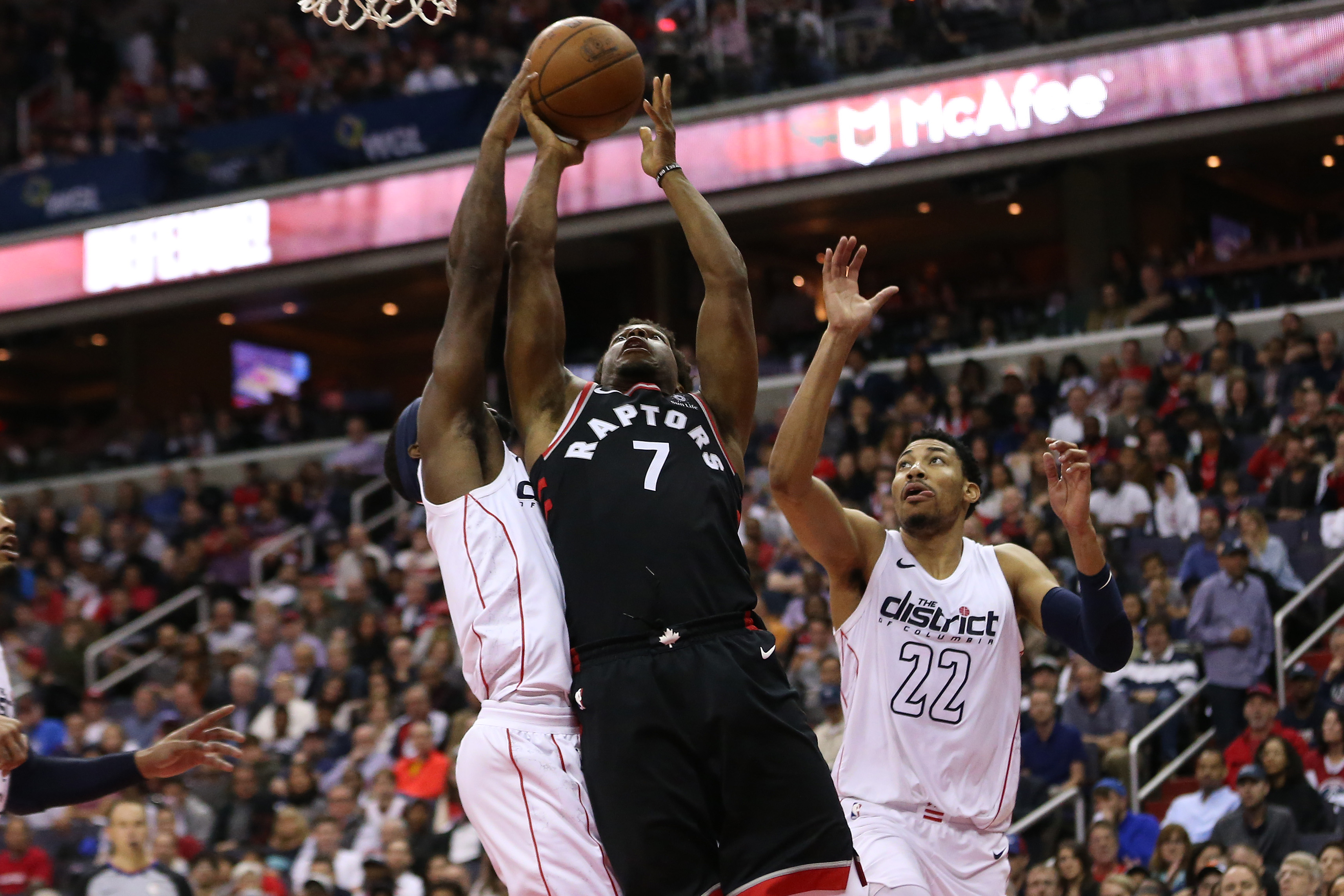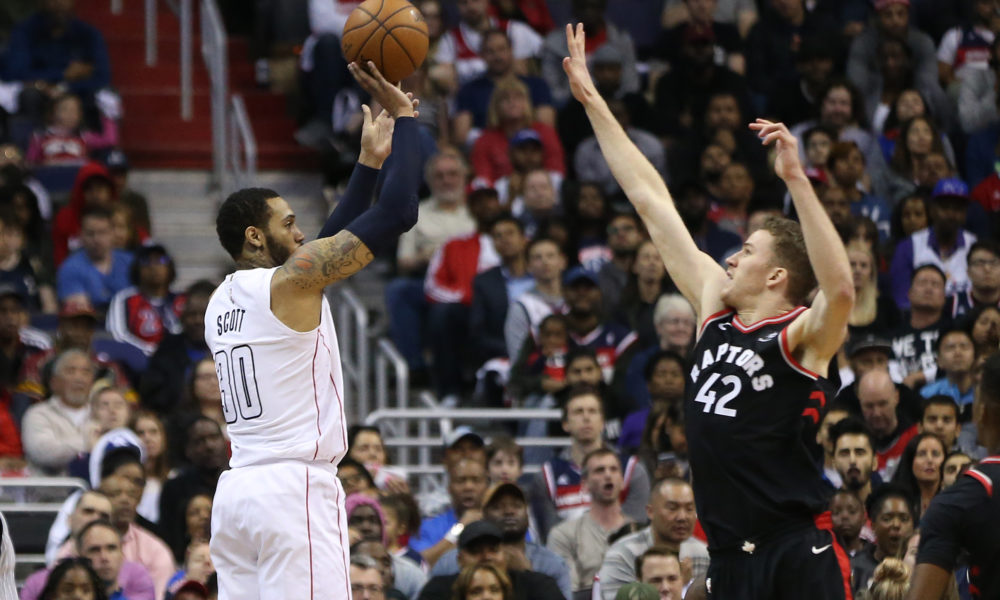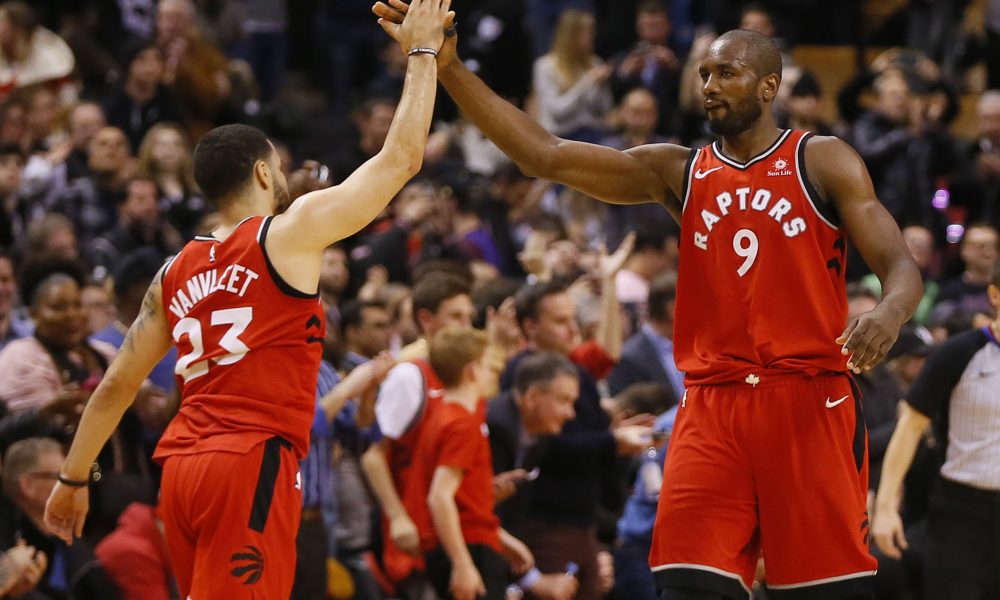Just a few days ago, it felt like Wednesday could be relatively stress-free. Or if not stress-free, low on angst, Kyle Lowry’s new favorite word. The Toronto Raptors had taken a 2-0 series lead against the Washington Wizards and if they could take just one of two games in Washington, they’d have a chance to close out at home here and end a series in five for the first time ever. Instead, they turned in a lackluster performance in a Game 3 blowout loss, then completely lost the plot down the stretch of Game 4, and they’ll now need to protect home court with their backs at least a little against the Air Canada Centre walls. There is no panic – they’ve essentially shortened the series to a best-of-three, for which they hold home-court advantage – but there should be some urgency.
To wit, per ESPN’s Kevin Pelton, win the higher-seeded team wins Game 5, they’ve gone on to win the series 93 percent of the time since 1984. The lower-seeded team, on the other hand, will win 63 percent of the time after taking Game 5 on the road. Put those together, and the Raptors odds swing a full 56 percent based on the outcome of this one, as a win gives them two chances (including one at home) to win just one more, while a loss forces them to win two straight, including one in Washington where the Wizards have won eight straight in the playoffs and are 11-2 in their last 13 postseason games. Again, home court should be paramount, and Dwane Casey has called on fans to bring the team an edge.
“That’s one reason why you play as hard as you do for 82 games, to get home-court advantage. You take care of home and both teams have taken care of home,” Casey said at practice Tuesday. “We’ve got to do a good job of continuing to do that tomorrow night, and I hope our home court crowd is as a loud and vicious and boisterous as they were in Washington the other night. There were some things coming out there – they were rabid. It was a hot environment on Sunday, so we have to turn around and do the same thing. I hope our crowd is loud on Washington and making it so they can’t call out plays and whatever. It’s very important. I think we have one of the best home courts in the league.”
The Raptors have spoke with a more measured approach in this 2-2 situation than in recent years, owing to their experience going through this kind of series and their faith in home court and their Eastern Conference-best record. To take control of the series back, they’ll need to get back to playing the way that got them to 59 wins in the first place, maintaining their composure a little better than the last two times out. That’s entirely within them, and the margin for error is shrinking. Game 5 has a huge say in how the series plays out from here.
The game tips off at 7 on NBA TV and TSN 1/4/5 on TV and on NewsTalk 1010 on radio.
—
To help recalibrate the series and gain some Washington perspective, we traded questions with Conor Dirks of Truth About It.
Blake Murphy: Well, that was certainly a turnaround. I’m not sure exactly where to start given everything that changed when the series shifted to Washington, so I guess I’ll just ask how you feel about the series in general at this point relative to the start? We’d both picked Raptors in 6 initially, which is still on the table, but the first four didn’t go quite how I expected.
Conor Dirks: Like you said, we both picked the Raptors in 6. That means we both expected the Wizards to win (exactly) two games, which they’ve now done. Washington’s two home wins may seem surprising in a generic #1 versus #8 matchup, but the Wizards aren’t a typical 8 seed. They were floating around the top half of the East when Wall went down, and well…he’s back. But essentially: I agree with you. This isn’t how I expected the first four games to go. Washington has been competitive in three of four games, winning two. Wall has been consistently good, looks springy and aggressive. In Game 1, his layups didn’t go down (and he certainly heard about it from Raptors fans). But as Washington’s PR department pointed out, in Games 3 and 4, he joined Magic Johnson as the only players to put up at least 27 points, 14 assists, and 6 rebounds in consecutive playoff games. I didn’t expect him to be this good coming off of his knee surgery.
On the flip side, I didn’t expect DeRozan to “take over” like he did in Game 4. His usage rate was 46.4% for the game, which is outrageous, and seemingly counter to Toronto’s culture shift this season. The reintroduction of that style of play could make this a closer series than it should be. I won’t change my prediction, but I’m less confident that this ends without an agonizing Game 7 in Toronto.
Blake Murphy: The big change for Washington on the defensive end was to limit their usual traps and blitzes at the point of attack, instead switching more frequently, getting aggressive within those switches, and basically daring Kyle Lowry and DeMar DeRozan to beat them one-on-one. In years past, this would have been catnip for the Raptors. It’s not supposed to be who they are anymore. How much faith do you have in Washington’s individual defenders to continue to execute this effectively enough where they can afford to not send help on Toronto’s stars?
Conor Dirks: It depends on the defender. The Game 4 numbers are interesting, and probably the most representative of Washington’s evolving plan on how to defend Lowry and DeRozan.
Otto Porter was the primary defender, defending DeRozan on 30 possessions. DeRozan did OK against Porter, going 5-for-12. In a game where DeRozan struggled overall, those are decent numbers. Porter has a hip issue, and it slows his first step considerably. Toronto could get a lot of mileage out of pushing this matchup in their typical, flowy offense. But if DeRozan plays horizontal isolation basketball, it lets Porter off the hook.
Beal barely guarded DeRozan. The Wizards hid him completely, and the result was that Beal only guarded DeRozan for eight total possessions. DeRozan was 0-for-1 against Beal, but also drew a foul and a pair of free throws, which he made. In the fourth quarter, the Wizards stuck Wall with the assignment more frequently, and the results were pretty good. Wall held DeRozan to 3-for-8 shooting and a turnover overall, without fouling him.
Lowry, on the other hand, basically did what he wanted. Against Wall, Lowry shot 57.1%, and was 3-for-4 on 3-pointers. Wall got caught sleeping on a Lowry drive, got caught unaware on a few Lowry long 3-pointers, and struggled to contain his fellow All-Star more often than not. Toronto’s offense also flowed pretty well with this matchup. Beal actually did a nice job on Lowry, mostly denying the ball and giving DeRozan more of a reason to take it himself. But you know as well as I do that Lowry can go off, and there aren’t many defenders in the league who can stop him on those nights. I don’t have a ton of confidence that the Wizards can handle the Raptors defensively if Lowry is hitting shots and the ball is touching everyone’s hands.
Blake Murphy: John Wall and Bradley Beal have found a heck of a groove the last two games. All year, Toronto has defended by dropping back in the pick-and-roll in order to send less help, cut down on opponent 3-point attempts, and goad mid-range shots. It’s working to that end – Washington has rarely taken corner threes and lead the playoffs in non-paint twos. And still, Wall and Beal are dominating. How have the Wizards played against defenses that operate differently? That is, if Toronto suddenly employed, say, Washington’s Game 1 defense against them, could that potentially rattle them at all?
Conor Dirks: Ah, the ghost of Randy Wittman smiles tonight. Wall and Beal have a lot of practice shooting midrange jumpers. They’re still not good shots, and they still make them at a rate that isn’t conducive to winning basketball over the course of a game or a season. And you saw that in the first half of Game 4. Force the Wizards to slow down in the half court, and they will run the shot clock to its bone, settle for midrange shots, and turn the ball over. The Raptors defended Washington really well in the first half, and that was the result. I don’t think Toronto should alter that game plan. If you sag off the Wizards and let them shoot 3s, Beal and Porter will kill you.
In the second half, the Raps let Beal get free on a few screens, and he found his rhythm from deep. You see the Wizards “wake up” sometimes, and it looks a lot like grabbing a defensive rebound, pushing the ball ahead to a sprinting Wall, dragging defenders in to defend the layup, and Wall finding Porter, Beal or (to a lesser extent) Oubre with an open 3-point shot. Another thing that many non-Wizards observers could miss is where Wall is taking those midrange shots. From the right elbow, right around the free throw line, he’s been very good throughout his career. It’s his sweet spot. You saw the Raptors give him this shot a few times, and he stuck them. His defender needs to be aware of that. Push him anywhere else…a little farther back, or to the left, and his percentage decreases.
Blake Murphy: What has been the biggest surprise of the series so far for you, on either side?
Conor Dirks: Maybe I don’t watch the Raptors enough, but I expected more from Ibaka. Bigs who shoot well generally do well against Washington. Gortat and Mahimi are very slow to contest 3-point shots, and Morris will just foul, foul, foul, get a technical, foul, foul, and foul again until he’s been disqualified or ejected. So I’m confused as to why Ibaka has so little role in the offense. Two 3-point shots? Five total shots?
Blake Murphy: There was a lot of talk entering the series about intangible factors for the Wizards. They didn’t like each other, they didn’t like playing together, maybe the franchise would be better off with a quick loss to force changes, and so on. They certainly look to be on the same page now. Do you think Games 3 and 4 helped unify that room around a common focus a bit?
Conor Dirks: The franchise still needs a reset in the executive suite. They have five point guards, no backup wings, and Ian Mahinmi (one of the worst rotation players in the NBA this year) makes $16,000,000 per annum.
But forgive me if I never quite bought into a myth about team discord that grew from an off-hand comment from J.J. Barea about John Wall. Wall and Beal have always been close, and I think both of them know their relationship is symbiotic. Wall needs a knock-down shooter, and Beal needs a ball-handler. Any rift within the team seemed to be between Wall and Gortat (who has a little bit of a history when it comes to whining).
What’s impressive to me is that the Wizards didn’t fold after a disastrous Game 2. That loss certainly lent an air of inevitability to the series that now seems undeserving. The Wizards came out swinging in Game 3 and never let up. The good news for Toronto is that it takes All-NBA level games from Wall and Beal, with help from Oubre and Gortat, to beat them. The bad news for Toronto is that they didn’t step on Washington’s neck in Game 4. Toronto should have won that game. And we haven’t seen an Otto Porter game yet.
—
Raptors updates
Fred VanVleet is once again listed as doubtful here. On the encouraging side, he was shooting a fair amount after a film session Monday and was a participant in practice Tuesday, so it at least appears he’s been able to ramp his activity back up over the last few days. It’s now been two weeks since the initial injury, which was supposed to be on the short end of his return-to-play timeline, and now it’s a matter of finding a comfort level where his range of motion allows him to shoot freely and the risk of re-injury – which isn’t going away for a few weeks still – isn’t on his mind. It sounded yesterday like he could get the bump to questionable, and he’ll once again be a call made closer to game time.
Dwane Casey also called OG Anunoby “day-to-day” on Tuesday. Anunoby rolled his right ankle in Sunday’s game but was able to return, and he was out around the court long after practice Tuesday (he participated, as well). Him showing up on the injury report at the last minute would be a little surprising. Norman Powell would probably figure to start if Anunoby can’t go. Were Anunoby to play and VanVleet to sit, the rotation will probably look pretty familiar. Inserting VanVleet would reset things closer to the regular season rotation, while missing both would throw everything for a loop and once again take them back to some of the odd-ball lineups from earlier in the series.
PG: Kyle Lowry, Delon Wright, Lorenzo Brown
SG: DeMar DeRozan, Norman Powell
SF: OG Anunoby, C.J. Miles
PF: Serge Ibaka, Pascal Siakam, Alfonzo McKinnie
C: Jonas Valanciunas, Jakob Poeltl, Lucas Nogueira
TBD: Fred VanVleet
OUT: None
INACTIVE: Malachi Richardson
Wizards updates
Washington remains healthy outside of the usual bumps and bruises, missing only Jodie Meeks due to suspension. For shame. It looks as if Scott Brooks has settled in on his 10-man rotation, one that gets trimmed even further in the second half. John Wall played 43 minutes in Game 4 and leads the series in minutes, Bradley Beal was right there beside him until fouling out, and Brooks didn’t use any all-bench lineups in the second half at all. He’ll try to have one of Wall or Beal, often with a second starter, on the floor at all times. And you can probably expect to see a lot of Mike Scott again, as he’s shooting 69 percent from the floor, 60 percent on threes, leads the postseason in effective field-goal percentage, and leads the series in net rating. Bold choice to play entire games while carrying around the Gerald Henderson Award, but here we are.
PG: John Wall, Ty Lawson, Tim Frazier
SG: Bradley Beal, Tomas Satoransky
SF: Otto Porter, Kelly Oubre
PF: Markieff Morris, Mike Scott, Jason Smith
C: Marcin Gortat, Ian Mahinmi
TBD: None
OUT: Jodie Meeks
INACTIVE: Ramon Sessions, Chris McCullough
The line
Game 1: Raptors -8 (Series Raptors -630) (Raptors 114, Wizards 106)
Game 2: Raptors -7 (Series Raptors -800) (Raptors 130, Wizards 119)
Game 3: Wizards -1.5 (Series Raptors -1600) (Wizards 122, Raptors 103)
Game 4: Raptors -2 (Series Raptors -650) (Wizards 106, Raptors 98)
Game 5: Raptors -7
Series: Raptors -340 (implied probability of 77.3 percent)
The Raptors are once again significant favorites here, coming in with the same spread as in Game 2. The Raptors covered in that game, Washington covered in Games 3 and 4, and there was a push in Game 1. The line normalizing to where it was before the series went on the road makes sense, even if Washington bounced back with two victories – these are still the same teams, and the Raptors were the NBA’s best home team this year. That’s why there’s still heavy market confidence in the Raptors winning the series, too, and are still firmly in the mix with Philadelphia and Cleveland as favorites to get out of the East. The over-under sits at 216, a mark the teams have cleared three times in four games.



